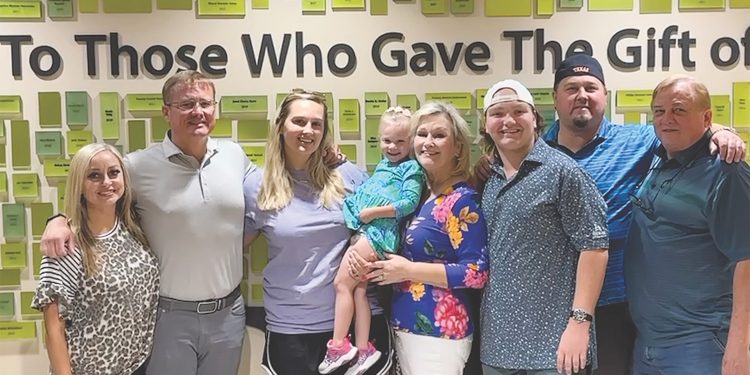They named their kidney Betty.
David K. Sargent and his sister, Ashlee Jones, did not really have a relationship growing up. A 15-year age gap and the fact that David got his driver’s license when Ashlee was only a year old meant the two didn’t spend much time together.
Now, they are forever linked, after Ashlee literally gave David a part of herself, a kidney named Betty.
“I prayed about what was happening,” said Ashlee, 29, a stay-at-home mom to a busy 3-year-old daughter who lives in Aubrey. “I talked to my husband and he was very supportive. I was at peace with it.”
David, 44, was overwhelmed.
“It was very touching,” he said. “It was hard for me to get my arms around.”
David, president of Stripe-A-Zone in Grand Prairie, had been battling renal failure for more than a decade. He was looking at a long wait for a kidney and years of dialysis. His 9-year-old son had grown accustomed to his dad’s low energy because he had been fighting it for the boy’s entire life.
David first started feeling ill in November 2012.
“I had no symptoms,” said David, who lives in Arlington. “I started feeling really sick and checked with a doctor. They tested my blood and sent me to a hospital. They said ‘You didn’t walk in here.’ They tested my blood again and sent me to a bigger hospital.”
David’s creatinine, a waste product that is removed by the kidneys through the blood, was at 19. The normal level for an adult is 1.8 to 1.9, anything over 5.0 in adults signals severe kidney impairment. His kidneys were analyzed and scraped, and dialysis was begun over an 11-day stay at Arlington Memorial Hospital.
“They said my kidneys were virtually dead and they wouldn’t restart,” David said. “After dialysis, I felt instantly better. I think it was so gradual that I didn’t realize how bad I felt.”
He went to dialysis three days a week for four hours each day for eight months.
“Dialysis made me feel so bad,” David said. “It wasted a whole day. Most people can sleep through it. I couldn’t. So I would read, but I couldn’t remember what I read. It felt like I had just run a marathon.”
He went on a hunting trip where one of the other hunters asked if he could pray for him. And then he started urinating yellow, a sign that his kidneys were functioning. David asked his doctor to test him again, instead he put him on a seven-day dialysis that he could do at home.
On his next hunting trip, the portable dialysis machine wouldn’t function, but David’s kidneys did. His doctor tested him again and discovered that his kidneys were functioning at 20 percent, the minimum that he could go without dialysis. After promising his doctor that he would return if he started feeling sick, he went home and made it for almost a decade without needing dialysis.
In October 2021, a routine lab test showed a decline in his kidney function.
“The doctor really wanted me back on dialysis,” David said. “I had originally been on the UNOS list (United Network for Organ Sharing). The wait list for my Type A blood was about four years. When my kidney function came back at 20 percent, they kicked me off the wait list. So I had to get back on the list. It looked like I was going to have to go back on dialysis because I couldn’t wait four years.
“Then Ashlee called,” he said.
Ashlee didn’t realize how severe her brother’s condition was.
“In 2012, I was heading to college. I did not realize the severity of his illness back then. He is a very private person. I didn’t know a lot of the details about his renal failure until today. My father would share some of these things.”
But Ashlee knew what she needed to do.
“There was no questioning,” she said. “Honestly, I thought just me saying yes would do it.”
But there was a lot more, checking if her kidney was a match for her brother’s, if she could survive on one kidney, if the kidney was healthy.
“They really tried to talk me out of it,” Ashlee said of the doctors. “I wanted more children and now I’m at risk having more children. So much blood work and lab work.”
The siblings checked into Baylor Scott & White in Fort Worth on July 27, 2022, and the surgery was completed within a few hours, the hospital’s first robotic surgery. Three days later, they were both discharged. David had to return a couple of days later when he started to feel sick again.
“They said I was rejecting the kidney,” David said.
After seven days of treatment, he was released.
The past year with the new kidney has been life-changing for David. He lost 84 pounds, went from 60-plus pills a day to nine and his creatinine level is at 1.7. After getting the new kidney, he felt better, so he started doing more, then he started losing weight, so he started exercising, then he changed his diet and stopped working as hard.
“My only wish was for him to change his lifestyle.” Ashlee said. She continues, “I wanted him to start putting his family first and enjoying his life. He was a workaholic.”
David’s high-pressure job and stress probably led to his renal failure, he said.
But Betty the kidney has changed some things, too.
“I never had a sweet tooth, but Ashlee has a big sweet tooth,” David said. “After the transplant, I was having a Butterfinger Blizzard every day, and still losing two or three pounds a day. Now it’s carrot cake.”
Carrot cake and Butterfinger Blizzards are two of Ashlee’s favorites, and apparently Betty’s, too.
Ashlee and her brother had not had an easy-going, joking relationship, but now they are much closer.
“I’m indebted to her for her sacrifice,” David said. “It says something about her character. She’s a good person.”
David, who can find the humor in almost every situation, did share with his sister how much he cares.
“He’s not a very sentimental person,” Ashlee said. “He sent me a very sentimental text. I’m going to take that and hold it to my heart.”
The siblings shared a celebratory dinner on the anniversary of their transplant with their families in July, and in October the hospital put Ashlee’s name on the transplant donor wall. The family remains grateful for the support of their family and friends throughout this journey. Both David and Ashlee realize this support helped them through their healing process and continues today.
They expect to celebrate a lot more milestones together with Betty the kidney, named after actress Betty White, who lived almost 100 years.
“I think I’ll live a long happy life,” David said. “This kidney will last at least 20 years.”
















